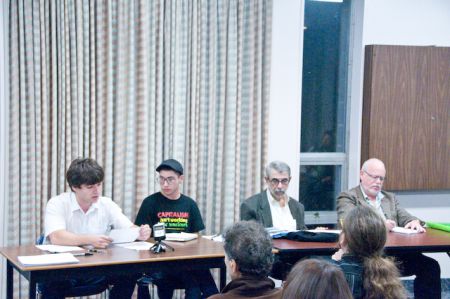Last week a panel with three thinkers in the anti-capitalist movement sat down to discuss the “Politics of Work,” delving into issues of employment and unemployment, labour unions and co-operatives.
Around thirty people attended the panel hosted by NSPIRG.
A member of the Dalhousie Platypus Affiliated Society, which meets to discuss neo-Marxist thought and the political Left, moderated the panel.
“The anti-capitalist movement is facing grave difficulties – we must get back to rethink the basis, which is work,” said Professor George Caffentzis, a political philosopher and professor at the University of Southern Maine.
Caffentzis also spoke at the 250th anniversary celebration of the Halifax Commons.
Shay Enxuga, organizer with the Baristas Rise Up and the Just Us! Coffee union drive, spoke about the inherent contradiction in unions because they do not really distinguish between the interest of the union/workers and that of the bosses.
“Unions and co-ops operate under the same limitations in a capitalist economy. Truly dignified work cannot exist in a capitalist system,” said Enxuga, arguing that unions and co-operatives have an interest in the survival of the business.
“Unions, if they only serve for material conditions, do nothing to shift power relations,” Enxuga added.
Larry Haiven, professor of Business Management at Saint Mary's University and member of Solidarity Halifax, explained the importance of how workers think about the value of their own work.
In 2008, Haiven co-authored a study on economic prosperity and family wages in Nova Scotia, where he discovered a discrepancy between the rising productivity of the province and a decline in the average wage of workers.
“From 1981- 2007 the GDP per person grew, we were 60 per cent wealthier as a province,” he stated.
Meanwhile, the real weekly income of workers had dropped – they brought home less in 2007 then in 1981. Why? The report found that only a very select few have profited while those whose work contributed to the prosperity have not seen any benefit.
The increasing income inequality was based on workers' perception: workers didn’t realize that their work was worth more than what they were being compensated.
Haiven has observed this throughout his years of experience as a union organizer. Workers “need a strong sense of entitlement, in the positive sense,” he said. “Then they will fight for more and settle for less.”
The panelists agreed that workers need to fight for better wages and benefits, but ultimately it is a losing game for workers if there isn’t a shift to a more democratic perception and ownership of businesses.
“There’s nothing inherent about a labour union or co-op that will lead to a higher consciousness. It has to be intentionally brought in. So much can be done with these progressive organizations,” Haiven said.



